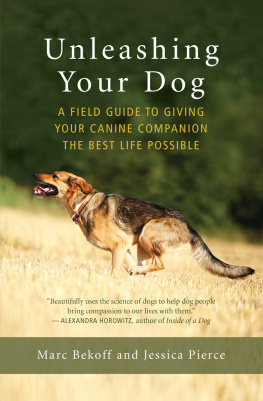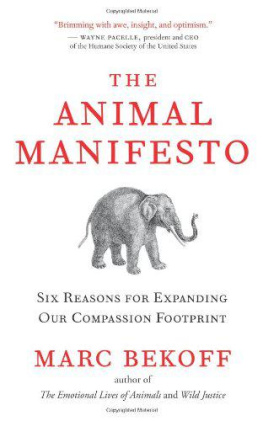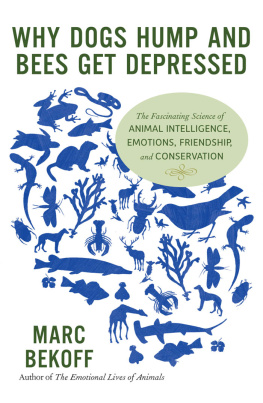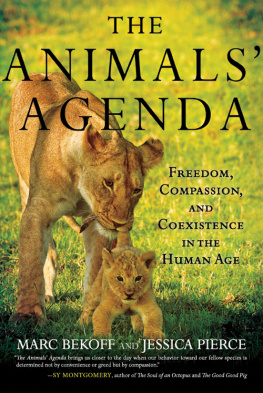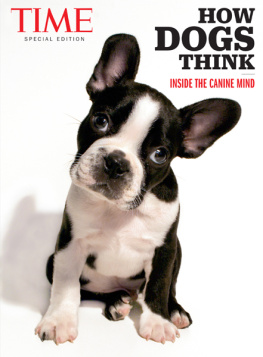W e both thank Jason Gardner, Monique Muhlenkamp, and the entire crew at New World Library for their faith in this project and for their unwavering support. As usual, Jeff Campbell did a fine job of copy-editing. Marc thanks Jessica for continuing to work with him and is ever grateful for her wit, novel insights, sarcasm, dark chocolate, and willingness to brainstorm. Valerie Belt, Betty Moss, and Peter Fisher continue to jam up his email inbox with references from all over the world, without which many very interesting and important sources would have remained unknown. Jessica would like to thank Marc for his ongoing collaboration, which has felt a lot more like play than work. Thanks, also, to Maya and Bella, whose companionship is unparalleled.
Also by Marc Bekoff and Jessica Pierce
The Animals Agenda: Freedom, Compassion, and Coexistence in the Human Age
Wild Justice: The Moral Lives of Animals
M arc Bekoff is professor emeritus of ecology and evolutionary biology at the University of Colorado, Boulder. A fellow of the Animal Behavior Society, a recipient of their Exemplar Award for long-term significant contributions to the field of animal behavior, and a former Guggenheim Fellow, he has written and edited more than thirty books, the latest being The Animals Agenda: Freedom, Compassion, and Coexistence in the Human Age and Canine Confidential: Why Dogs Do What They Do. Marc was presented with the Bank One Faculty Community Service Award in 2005 for the work he has done with children, senior citizens, and inmates, much of which continues today. In 2009 he was granted the St. Francis of Assisi Award by the New Zealand SPCA, and in 1986 Marc became the first American to win his age-class at the Tour du Haut Var bicycle race (also called the Masters/age-graded Tour de France). His homepage is marcbekoff.com.
J essica Pierce is an affiliate faculty at the Center for Bio-ethics and Humanities, University of Colorado Anschutz Medical School. She is the author of nine books, including The Last Walk: Reflections on Our Pets at the End of Their Lives and Run, Spot, Run: The Ethics of Keeping Pets, and she has published essays in the New York Times, the Wall Street Journal, and the Guardian and is a regular contributor to Psychology Today. Her homepage is jessicapierce.net.
H ere are some key references for the topics weve discussed. Many have been cited in the text, and others are included to indicate the broad range of research that has been done on dogs, their wild relatives, and other animals.
Abbott, Elizabeth. Dogs and Underdogs: Finding Happiness at Both Ends of the Leash. New York: Viking, 2015.
Abrantes, Roger. Dog Language: An Encyclopedia of Canine Behaviour. Ann Arbor, MI: Wakan Tanka, 2009.
Allen, Laurel. Dog Parks: Benefits and Liabilities. Masters capstone project, University of Pennsylvania, May 29, 2007. http://repository.upenn.edu/cgi/viewcontent.cgi?article=1017&context=mes_capstones.
Andics, A., A. Gbor, M. Gcsi, T. Farag, D. Szab, and . Miklsi. Neural Mechanisms for Lexical Processing in Dogs. Science 353 (September 2016): 103032. http://science.sciencemag.org/content/early/2016/08/26/science.aaf3777.
Archer, John. Why Do People Love Their Pets? Evolution and Human Behavior 18 (1997): 23759. http://courses.washington.edu/evpsych/archer_why-do-people-love-their-pets_1997.pdf.
Arden, Rosalind, and Mark James Adams. A General Intelligence Factor in Dogs. Intelligence 55 (2016): 7985. http://www.sciencedirect.com/science/article/pii/S016028961630023x.
Arden, Rosalind, Miles K. Bensky, and Mark J. Adams. A Review of Cognitive Abilities in Dogs, 1911 through 2016: More Individual Differences, Please! Current Directions in Psychological Science 25, no. 5 (2016): 30712. http://journals.sagepub.com/doi/full/10.1177/0963721416667718.
Arnold, Jennifer. Love Is All You Need. New York: Spiegel & Grau, 2016.
Artelle, K.A., L.K. Dumoulin, and T.E. Reimchen. Behavioural Responses of Dogs to Asymmetrical Tail Wagging of a Robotic Dog Replica. Laterality 16 (2011): 12935. http://www.ncbi.nlm.nih.gov/pubmed/20087813.
Arthur, Nan Ken. Chill Out Fido!: How to Calm Your Dog. Wenatchee, WA: Dogwise Publishing, 2009.
Autier-Drian, Dominique, Bertrand L. Deputte, Karine Chalvet-Monfray, Marjorie Coulon, and Luc Mounier. Visual Discrimination of Species in Dogs (Canis familiaris). Animal Cognition 16, no. 4 (July 2013): 63751. https://www.ncbi.nlm.nih.gov/pubmed/23404258.
Blint, Anna, Tams Farag, Antal Dka, dm Miklsi, and Pter Pongrcz. Beware, I Am Big and Non-Dangerous!Playfully Growling Dogs Are Perceived Larger Than Their Actual Size by Their Canine Audience. Applied Animal Behaviour Science 148, nos. 12 (2013): 12837. https://www.sciencedirect.com/science/article/pii/s0168159113001871.
Ball, Philip. Dont Be Sniffy If You Smell like a Dog. Guardian.
May 14, 2017. https://www.theguardian.com/science/2017/may/14/dont-be-sniffy-if-you-smell-like-a-dog.
Bartram, Samantha. All Dogs Allowed. Parks and Recreation. National Recreation and Park Association. January 1, 2014. https://www.nrpa.org/parks-recreation-magazine/2014/january/all-dogs-allowed.
Bauer, Erika, and Barbara Smuts. Cooperation and Competition during Dyadic Play in Domestic Dogs, Canis familiaris. Animal Behaviour 73 (2007): 48999. http://psycnet.apa.org/psycinfo/2007-03752-013.
Beaver, Bonnie. Canine Behavior: Insights and Answers. 2nd ed. St. Louis: Saunders Elsevier, 2009.
Becker, Marty, Lisa Radosta, Wailani Sung, and Mikkel Becker. From Fearful to Fear Free. Deerfield Beach, FL: Health Communications, 2018.
Bekoff, Marc. Animal Emotions: Do Animals Think and Feel? (blog). Psychology Today, 2009present. https://www.psychologytoday.com/blog/animal-emotions.
. Anthropomorphic Double-Talk: Can Animals Be Happy but Not Unhappy? No! Animal Emotions (blog). Psychology Today, June 24, 2009. https://www.psychologytoday.com/blog/animal-emotions/200906/anthropomorphic-double-talk-can-animals-be-happy-not-unhappy-no.
.Bowsers on Botox: Dogs Get Eye Lifts, Tummy Tucks, and More. Animal Emotions (blog). Psychology Today, March 23, 2017. https://www.psychologytoday.com/blog/animal-emotions/201703/bowsers-botox-dogs-get-eye-lifts-tummy-tucks-and-more.
.Canine Confidential: Why Dogs Do What They Do. Chicago: University of Chicago Press, 2017.
.Do Dogs Ever Simply Want to Die to End the Pain? Animal Emotions (blog). Psychology Today, December 17, 2015. https://www.psychologytoday.com/blog/animal-emotions/201512/do-dogs-ever-simply-want-die-end-the-pain.
.Do Dogs Really Bite Someone for No Reason at All? Take Two. Animal Emotions (blog). Psychology Today, December 5, 2016. https://www.psychologytoday.com/blog/animal-emotions/201612/do-dogs-really-bite-someone-no-reason-all-take-two.
.Do Dogs Really Feel Guilt or Shame? We Really Dont Know. Animal Emotions (blog). Psychology Today, March 23, 2014. https://www.psychologytoday.com/blog/animal-emotions/201403/do-dogs-really-feel-guilt-or-shame-we-really-dont-know.
.Dogs and Guilt: We Simply Dont Know. Animal Emotions (blog). Psychology Today, February 9, 2018. https://www.psychologytoday.com/blog/animal-emotions/201802/dogs-and-guilt-we-simply-dont-know.
.Dogs: Do Calming Signals Always Work or Are They a Myth? Animal Emotions (blog). Psychology Today, June 25, 2017. https://www.psychologytoday.com/us/blog/animal-emotions/201706/dogs-do-calming-signals-always-work-or-are-they-myth.
.Dogs Growl Honestly and Women Understand Better Than Men. Animal Emotions
Next page
